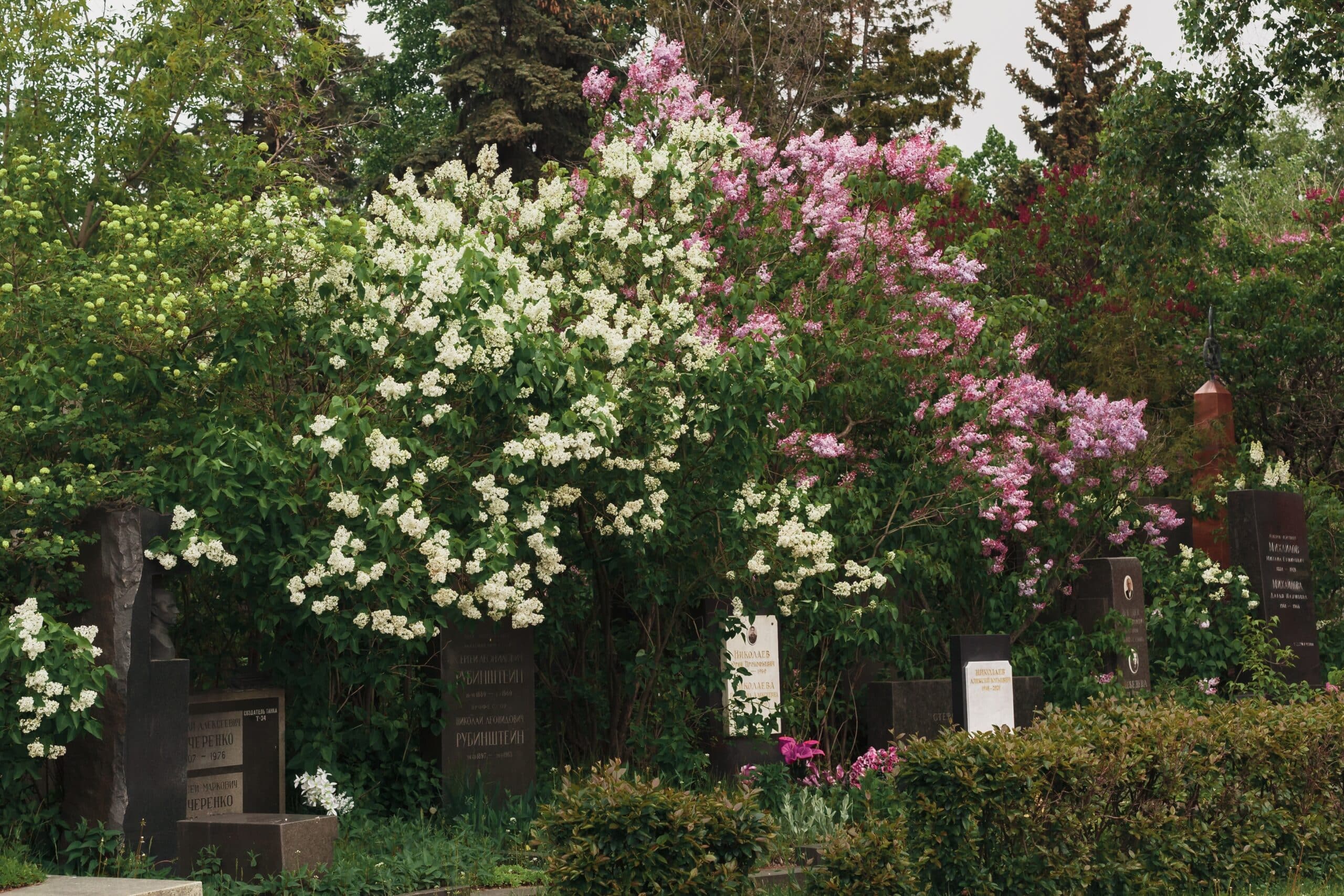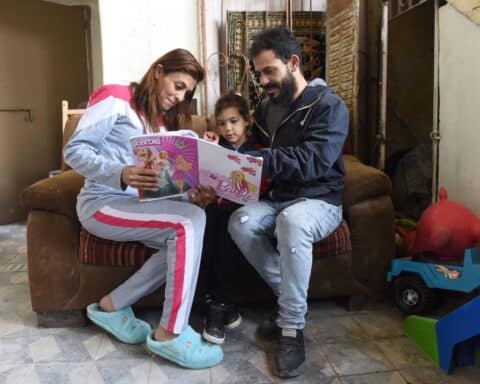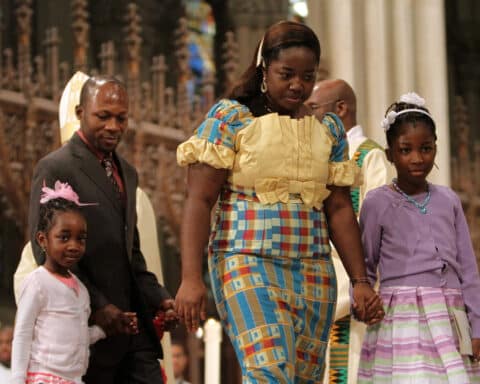We have a new annual tradition: Once a year, as many as possible of my far-flung siblings and I meet at my parents’ grave, back in the town where we grew up. We say a rosary, chat, and reminisce. Last year, the first year, I planted a little lilac tree.
It had been a long time since I sweated that much. We sat on the grass before the granite headstone in the blazing August sun in the middle of the day, this time me and two of my sisters and my brother-in-law. I thought it would be easy to find the spot, but the last time I had been at the cemetery, this particular plot stood out more, because there were mourners gathered around, and heaps of flowers, and a priest, and a canopy, and a casket, and an open grave for my mother, and a fairly fresh one for my father. It was much easier to spot that time.
Now the grave looks more or less like all the others: The stone with names and dates carved into it looks comfortably settled, surrounded by late summer grass, somewhat shaggy, a little parched, looking like it had been there forever. Someone had stuck a bunch of artificial purple flowers into the ground, long enough ago that they were faded in the sun.
Planting a lilac tree
I did come prepared. I brought a little lilac sapling from my house, and a couple of hearty rose bush cuttings that transplant well, and I brought a pickaxe and a short-handled shovel, and a small jug of water. It didn’t take long to get the green things in the ground. I also brought a bottle of soapy water to squirt at the headstone, and a little scrubbing brush to clear any grime out of the cracks and the letters of their names. The smell of a soapy lemon Joy cut through the summer haze of dry grass and cricket song, and in the fierce noon sun, the water quickly shrank up and disappeared.
It was so hot, that I was afraid the lilac tree would not survive. I didn’t bring nearly enough water, and I wasn’t sure when I could be back to care for it again. It’s only an hour away, but somehow it’s hard to get there.
Joining the Catholic Church
We prayed a decade of the rosary and talked a bit about our parents. My sister remembered my father storming home one day and demanding, “Who’s been praying for me?” The answer was, of course, my mother, and probably some of my sisters, who had already joined the Catholic Church and were desperately hoping my father would overcome his final fears and reservations and make the plunge himself. It was, my sister thinks, the Church’s history of antisemitism that hampered him, and he was puzzling and pondering this as he browsed through the library shelves one evening, and happened to look out the library window, which happened to overlook the cemetery, and the words happened to come into his head: “Let the dead bury the dead. Come and follow me.”
Fine.
I was too young to remember this moment, but I easily remember his characteristic joy mixed with exasperation. If it’s possible to wholeheartedly convert while being extremely irritated at the Lord and your family for praying you in, then that happened to my father.
Memories and stories of faith
I keep mulling over my parents’ conversion story because what it means seems to keep changing. As the sun blared on and we laughed and reminisced about my parents and how strange their story was, and how it affected us as we grew up, the talk inevitably turned to our own children, and how they are growing up, and how they have grown, and what they will do now. We marveled at how good it was to be able to spend the afternoon — the whole weekend, even — just traveling, doing as we pleased, without worrying about the children at home. They were so grown up, they could care for themselves. One of my sisters had just dropped off one of her sons at the airport; my other sister was on her way to the airport to pick up one of her daughters. My son was packing his room into boxes to move himself out.
As all mothers know, you can sit in the blazing hot sun and say, “It’s so good to be free!” and still feel a coldness steal over you. It did not escape me that I had gotten away for the day, only to visit a grave.
But I’m making this sound grotesque. It was a good day. We laughed and told stories and were glad to be together. We sat on the grass that grew over my parents’ old bodies and smiled at how ridiculous they sometimes were, and how brave, and how much they loved us. We laughed and beamed because we were glad and proud to hear about the good things our nieces and nephews were achieving, and we also reassured each other that lots of adult children drive poorly, lots of adult children have a hard time holding down a job, lots of adult children seem unprepared for life in general. “What will become of them” I murmured in a ghostly voice, and everybody laughed, but not very hard.
Meaning in ritual
I drove back home, and the next day at Mass, I stood in the pew with some of my children who still go to church. I do pray for all of them, every day. “Have mercy on us,” we said.
Who knows how that will work itself out, and what conversions and hesitations and irritations they will have to work through?
“Have mercy on us.”
My youngest child, who still does what I tell her to do, still cares what I think, and still tells me everything that pops into her head, craned up on her tiptoes halfway through the Kyrie and stage-whispered into my ear, “Did you know that if you chew on nothing, then your head will start to hurt?”
I hadn’t thought about that, but I believe she’s right.
“Grant us peace,” we said.
We are made to look for meaning. We are built to find significance and work through rituals and crave fulfillment in this life. It’s not a bad thing to show up with a scrubbing brush and try to sharpen up the letters on the family headstone, retell the family stories and keep things clean and legible for the living. But there is also such a thing as knowing when one chapter ends, and a new one begins. Or knowing whose story is whose.
When I came back this year, the little lilac was still alive. It may or may not survive. If not, I can come back next year and plant another one. Or I suppose I could just let it go.





